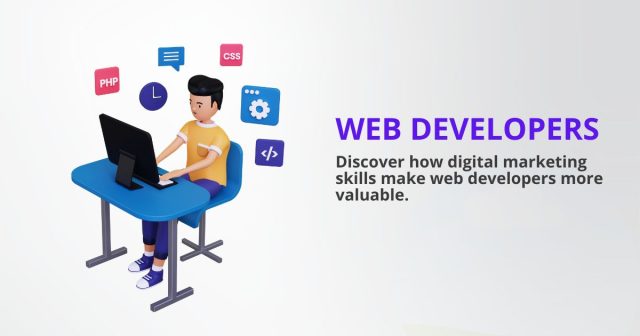Web development and digital marketing might seem like two separate worlds. Developers focus on code, functionality, and user experience, while marketers concentrate on campaigns, analytics, and customer acquisition. But the lines between these disciplines are blurring faster than ever.
The most successful web developers understand that building a website is only half the battle. The other half involves making sure people can find it, use it, and convert on it. When developers gain digital marketing skills, they become more valuable to employers, better at freelancing, and capable of building websites that actually drive business results.
Learning digital marketing doesn’t mean abandoning your coding skills. Instead, it means expanding your toolkit to include the strategies that make websites successful in the real world.
The Growing Overlap Between Development and Marketing

Modern web development increasingly involves marketing considerations. Search engine optimization affects site architecture. Conversion rate optimization influences design decisions. Performance optimization impacts ad spend efficiency. Social media integration requires technical implementation.
Developers who understand these connections build better websites from the ground up. They make technical decisions that support marketing goals rather than creating obstacles for them later.
Companies are also looking for professionals who can bridge the gap between technical and marketing teams. A developer who speaks both languages becomes invaluable for translating marketing requirements into technical solutions and explaining technical limitations in business terms.
Essential Digital Marketing Skills for Developers
Search Engine Optimization (SEO)
SEO knowledge helps developers build websites that search engines can easily crawl and index. This includes understanding how page speed affects rankings, implementing proper URL structures, and creating semantic HTML that search engines can interpret.
Technical SEO specifically falls into the developer’s domain. Skills like optimizing Core Web Vitals, implementing structured data markup, and managing crawl budgets directly impact a website’s search performance.
Analytics and Data Analysis
Developers who understand Google Analytics, heat mapping tools, and other analytics platforms can build better tracking implementations and interpret user behavior data. This knowledge helps in making data-driven decisions about site improvements and feature development.
Being able to set up proper tracking also means understanding what metrics matter for different types of websites and how technical choices affect data collection.
Conversion Rate Optimization (CRO)
CRO involves testing different versions of web pages to see which performs better. Developers who understand A/B testing principles can build testing frameworks, implement tracking for experiments, and create variations efficiently.
This skill set includes understanding statistical significance, user psychology principles, and how small technical details can impact conversion rates.
Performance Marketing
Understanding how paid advertising works helps developers optimize websites for ad traffic. Different traffic sources have different user behaviors and expectations, and sites need to be optimized accordingly.
Developers who understand performance marketing can also build better landing pages, implement proper UTM tracking, and create technical solutions that support advertising campaigns.
Career Benefits of Marketing Knowledge

Increased Employability
Job postings increasingly list marketing knowledge as a plus for developer positions. Companies want developers who can contribute to business goals, not just technical requirements.
Full-stack developers with marketing skills are particularly valuable because they can handle projects from conception to optimization without requiring multiple team members.
Better Freelancing Opportunities
Freelance developers who understand digital marketing can offer more comprehensive services to clients. Instead of just building websites, they can help clients develop online marketing strategies and implement them technically.
This expanded service offering typically commands higher rates and leads to longer client relationships.
Entrepreneurial Advantages
Developers who want to start their own businesses need marketing skills to promote their products or services. Understanding digital marketing channels, customer acquisition costs, and growth strategies becomes essential for business success.
Many successful tech entrepreneurs combine development skills with marketing knowledge to build and promote their own products.
Practical Ways to Start Learning
Begin with SEO Fundamentals
Start by learning how search engines work and what factors influence rankings. Focus on technical SEO elements that directly relate to development work, such as site speed optimization, mobile responsiveness, and structured data implementation.
Google’s Search Central documentation provides excellent technical resources for developers interested in SEO.
Explore Analytics Tools
Set up Google Analytics on your projects and spend time understanding what the data reveals about user behavior. Learn to identify common issues like high bounce rates or poor conversion paths.
Experiment with other analytics tools like Hotjar or Crazy Egg to see how users actually interact with your websites.
Study Conversion Optimization
Read case studies about successful A/B tests and conversion rate improvements. Understanding what elements typically impact conversions helps you make better design and development decisions.
Try implementing simple A/B tests on your own projects to gain hands-on experience with testing methodologies.
Follow Marketing Blogs and Podcasts
Stay updated on digital marketing trends and strategies by following reputable marketing publications. This helps you understand the broader context of how websites fit into marketing strategies.
Look for content that bridges the gap between technical implementation and marketing strategy.
Building Marketing-Informed Websites
Understanding digital marketing changes how you approach web development projects. You start considering user acquisition channels, conversion paths, and performance metrics during the planning phase rather than as afterthoughts.
Marketing-informed developers ask different questions: How will users find this website? What actions do we want them to take? How will we measure success? These questions lead to technical decisions that support business objectives.
This approach results in websites that perform better from launch, require fewer major revisions, and deliver measurable business value.
Bridging the Skills Gap
The technology industry needs more professionals who can work effectively across technical and marketing disciplines. Developers with marketing knowledge fill a crucial gap in many organizations.
These hybrid professionals often become technical leads for marketing teams or marketing-focused developers who can execute complex digital strategies. They understand both the possibilities and limitations of technology in marketing contexts.
Companies increasingly value this cross-functional expertise, especially as digital marketing becomes more technically complex and development becomes more user-focused.
Your Next Steps Forward
Learning digital marketing as a web developer doesn’t require abandoning your technical skills. Start by choosing one area that interests you most, whether that’s SEO, analytics, or conversion optimization.
Apply what you learn to your current projects. Set up proper analytics tracking, optimize for search engines, or run simple conversion tests. Practical experience reinforces theoretical knowledge and provides tangible results you can showcase.
Consider how marketing knowledge might fit into your career goals. Whether you want to become more valuable as an employee, expand your freelancing services, or start your own business, digital marketing skills provide multiple paths forward.
The web development landscape continues evolving toward more marketing-integrated approaches. Developers who embrace this trend position themselves for greater success in an increasingly competitive field.







